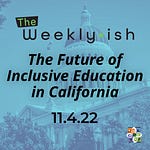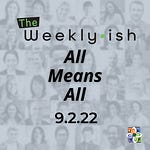Hi, Y’all!
As I’ve written about before, school board elections are important. And while we cannot endorse candidates for any public office because we are a nonpartisan organization, there is a candidate running for election in Minnesota that you’ll want to know about.
My name is Sonya Emrick.
I am a parent of two disabled kids and I am a disability justice activist,
And I'm running for Minneapolis public school board.
Tim Villegas
So, what inspired you to run for school board?
Sonya Emerick
Well, my now six-year-old child has been receiving early childhood special education since he was two through my district in Minneapolis.
And we had a really great birth to three educator. When we were doing evaluations for his first IEP one of the tools used was to measure like social, emotional resilience.
I went to give it back to her and I said, you take this, and you can use it but it's not going to give you any information about my kid, my kid is autistic. And this just tells you how far away he from a neurotypical kid
And that sparked a conversation where, you know, as an autistic person, raising autistic kids I see developmental trajectories differently.
I think that we need disabled people at the table to inform our perspectives and help us develop our solutions to some really big problems. And I think it’s needed in my district. And I'm hoping I get the opportunity to provide that service here.
Tim Villegas
So as an autistic person and a parent of an autistic child, how do you think that experience would help inform you being on the school board and representing or supporting all students?
Sonya Emerick
As I have gotten, deeper and deeper into disability justice work and being introduced to the work of people like Talila Lewis and the Sins Invalid collective and Imani Barbarin and Lydia X. Z. Brown, people who are doing such important work at the intersection of race and disability.
I have learned so much about how connected racism ableism are. I'm in Minneapolis. And my city, it may not be on the news anymore, but my city is still. Very much reeling and hurting and trying to heal from George Floyd's murder. And it has impacted our entire school district. Our kids are quite traumatized. And when we think about the kids in my district, which is about two-thirds kids of color, about 20% receiving special education services,
I think inclusion touches all of that, right? Like I've said before, inclusion is not, can the wheelchair fit to the door? Inclusion is, are we meaningfully creating places of belonging for every student? Are we making sure the onus to belong in a learning community is never on the student but that we're responsible for creating those places?
Tim Villegas
So what would be some of your goals if you were elected on the school board?
Sonya Emerick
I think that every piece of my platform really iterates back to making those spaces for belonging and the specific strategies are very, because I think it takes a lot of different strategies. So, for instance, in my district, we have. Approximately five white students to every one white educator and 55 black students to one black educator.
So, part of my platform is, recruiting and retaining educators of color.
Literacy is a big part of my framework. My district did just complete a three year roll out of comprehensive literacy instruction, which is really exciting for me because that's a framework that works so well for students with intellectual and developmental disabilities, who historically have not been provided rigorous evidence-based literacy instruction,
I believe very much that we need to expand our restorative justice practices that we use to help keep kids who are struggling in their learning communities supported as opposed to using exclusionary discipline.
What would it be like if we taught our kids that every single person in their classroom had to be there in order for us to be us and to learn together in the unique way that we've cultivated.
Tim Villegas
So, what do you think is the biggest barrier to inclusion in your school district?
Sonya Emerick
Focus on behavioral compliance.
Tim Villegas
Tell me more about that.
Sonya Emerick
Yeah. I think that we have behavior norms that are Eurocentric or informed by whiteness and that are ableist.
I think that there is no way that every child can be included if they have to be held to the expectation that they will perform behavior in a way that's not culturally responsive or culturally sustaining I think it's really traumatic and damaging.
Tim Villegas
In your view, what would be the solution or ease that barrier?
Sonya Emerick
Why do we say that we enforce behavior compliance? Because for classroom management, because we need safety first and foremost, for all students and all educational staff, and we need spaces that are conducive to learning happening.
I think that there's a lot of ways we can accomplish those goals without needing to rely heavily on behavioral compliance. Better instruction, when I talk about literacy and more evidence-based literacy instruction based in the science of reading, creating agreements with students in their classrooms about what they want their classroom culture to look like is a wonderful tool, right?
Using those restorative practices towards liberation, understanding that students are going to look a lot of different ways. And it's not a bad thing.
I don't think that students who are engaged and who feel confident about their ability to learn the material and who really feel accepted and a sense of belonging generally have a lot of behavioral issues. I don't think you need to use a lot of compliance strategies under those circumstances.
Tim Villegas
What if someone would say, well, you know, there needs to be consequences for behavior. If there's a small group of students being disruptive or refusing to do work there needs to be consequences.
How would you respond to that?
Sonya Emerick
Honestly, I would say. Tell me more about why you think that. And I would want to sort of dig in with some curiosity to hear, you know, what, where that is coming from in that, in that adult. Right. And then if I felt like I could be effective at, at helping a frame shift with that person, I would wanna move the conversation towards what do you think those kids might be needing that they're not getting.
I think it's a practice though, right? We can't do an hour of professional development with educators and help them make that shift. Right. That's something that requires practice over a long term and requires support so I think that like one thing that we're talking about in some of the work that, that I'm doing to try to reduce discipline disparities is do teachers need more in person support available throughout their school days for co-regulation with other.
What would that look like? What would it look like if you're a teacher and you can feel yourself getting stressed, to be able to have a five-minute check in with adult who's there to help you co provide support for you. And then could you bring that back to your kids? Right?
Tim Villegas
Sonya, this is the first time I've ever heard that. That's a great idea. I think that. It can naturally happen, but to be purposeful about it. I think that's a great idea.
Anything else before I let you go, that you wanted to share?
Sonya Emerick
I think that kids learn when they feel safe. And I think that the kids in my district aren't feeling safe right now.
If inclusion is happening, then felt safety is happening, right. If there's not a sense of felt safety, is it really inclusion? Are we really getting everyone what they need?
For information about the other candidates running for the Minneapolis school board, here is a link to a Minneapolis Public Schools School Board Voter Guide. The primary election takes place on Tuesday, August 9, 2022.
As always, if you ever have questions or comments email me at tvillegas@mcie.org or go to mcie.org to learn more about how we can partner with you and your school or district.
Thanks for your time, everyone. I’ll be back in a couple of weeks with another edition of The Weeklyish.
Have a great week!
ICYMI
5 Ways to Get Inclusion Started at Your School
Mazey Eddings | Neurodiverse Representation in Books
Why I Created My Podcast, Exceeding Expectations
Liz Weintraub & Kenneth Kelty | Using Content Creation for Disability Advocacy
Around the Web
Sexuality and Parenting Supports for People with IDD
Massachusetts First in the Nation to Open Colleges to Students with IDD and Autism
Mother shares journey advocating for inclusive education
Why Vice President Kamala Harris mentioned her blue suit at a disability rights meeting
What I’m Reading
Miracle and Wonder: Conversations with Paul Simon | Malcolm Gladwell | Official Trailer
What I’m Watching
Severance — Official Trailer | Apple TV+
What’s in my Pod Feed
Margy’s dad was a hoarder (What Was That Like)
“I Was A Stranger and You Welcomed Me” (Revisionist History)
“We are a technology-based school” (Inclusive Schools Spotlight Series)
“This Isn’t Just About Abortion”: What the End of Roe Means to You (Death, Sex & Money)
What I’m Listening To
The Pointer Sisters - Neutron Dance
What’s in my Timeline

From the Wayback Machine
Remote Work Brings More Than Silver Linings
Just Because
Vin Scully was the voice of baseball. Hear some of his greatest calls.
...
The Weeklyish is written, edited, and sound designed by Tim Villegas and is a production of MCIE.
Our intro stinger is by Miles Kredich.
And our outro is by REDProductions.
For information about inclusive education visit mcie.org and check out our flagship podcast, Think Inclusive, on your favorite podcast app.















